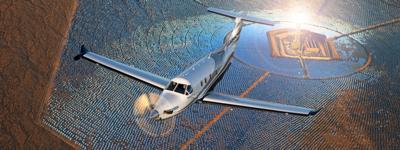Fri, Jun 07, 2024
Funky SAF Alternative Gets Vote of Confidence from Swiss Manufacturer
Pilatus and Synhelion have announced a partnership aimed at scaling up the use of solar fuels in aviation.

Pilatus will lead by example, using Synhelion's fuels in its own operations, and offer them to customers in similar fashion. To that end, Pilatus even became a shareholder in Synhelion, a brand spun off of ETH Zurich in 2016. The company aims to entirely decarbonize the travel industry with the use of their kinda-sorta-but-not-quite-SAF products. In a surprisingly pragmatic turn, Synhelion doesn't believe the industry will be able to run entirely off of biomass or waste products in order to make sustainable aviation fuel, stating it will "never be available in sufficient quantities, now or in the future." It's a little refreshing, since anyone with an idea of scale knows there aren't enough deep fryers in the world to sustain an entire jet fuel industry on their backs alone.
Synhelion is tackling the fuel issue from a different direction, building an "industrial solar fuel production plant" in Germany as a pilot plant, with a commercial one planned for Spain in 2025. Under their scheme, fuels are produced from solar energy...somehow. They're understandably cagey about the specifics, given the amount of money spent researching the process, but the basic system coalesces solar rays on a single point to leverage that heat to catalyze water and C02 into something that passes for pure fuels. They say their process can produce pretty much any of the most popular ones, including kerosene, gasoline, diesel, methanol, hydrogen, synthetic crude oil, and such. While they've begun working on small-scale manufacture, Synhelion hasn't produced much math to calculate just how much space and infrastructure it would take in order to generate enough solar fuel to make a dent in the supply. They cite one study that said solar fuels could cover "50 times the current global jet fuel demand",
but that likely rests on the ability to establish solar fields pretty much anywhere they have non-arable land - and even the owners of scrub land aren't too keen on filling their plots with panels yet. Once in full swing, Synhelion has a target price below one euro per liter by 2030, about on par with similar SAFs.
Philipp Furler, Co-CEO and co-founder of Synhelion, was happy about the collaboration. “We’re extremely proud to have Pilatus as a partner and shareholder. Over the next few years, we will focus fully on scaling our fuels worldwide. Together, we aim to roll out sustainable solar fuels to the entire Pilatus customer fleet within the next ten years.”
More News
“This vote sends an undeniable message to Air Transat management: We are unified, resolute, and have earned a contract that reflects today’s industry standards, not the>[...]
Aero Linx: Beech Aero Club The Beech Aero Club (BAC) is the international type club for owners and pilots of the Beech Musketeer aircraft and its derivatives, the Sport, Super, Sun>[...]
While Landing In The River, The Extended Landing Gear Contacted The Water And The Airplane Nosed Over, Resulting In Substantial Damage Analysis: The pilot of the amphibious airplan>[...]
From 2022 (YouTube Edition): Carrying the Legacy of The B-29 For Generations to Come We had a chance to chat with the Executive Director of B-29 Doc, Josh Wells, during their stop >[...]
Also: Cosmonaut Kicked Out, Airbus Scales Back, AF Silver Star, Russian A-60 Clobbered A Samaritan’s Purse humanitarian flight was hijacked on Tuesday, December 2, while atte>[...]
 Aero-News: Quote of the Day (12.07.25)
Aero-News: Quote of the Day (12.07.25) ANN's Daily Aero-Linx (12.07.25)
ANN's Daily Aero-Linx (12.07.25) NTSB Final Report: Lafferty Jack Sea Rey
NTSB Final Report: Lafferty Jack Sea Rey Classic Aero-TV: The B29 SuperFortress Doc - History in Flight
Classic Aero-TV: The B29 SuperFortress Doc - History in Flight Airborne 12.08.25: Samaritans Purse Hijack, FAA Med Relief, China Rocket Fail
Airborne 12.08.25: Samaritans Purse Hijack, FAA Med Relief, China Rocket Fail



